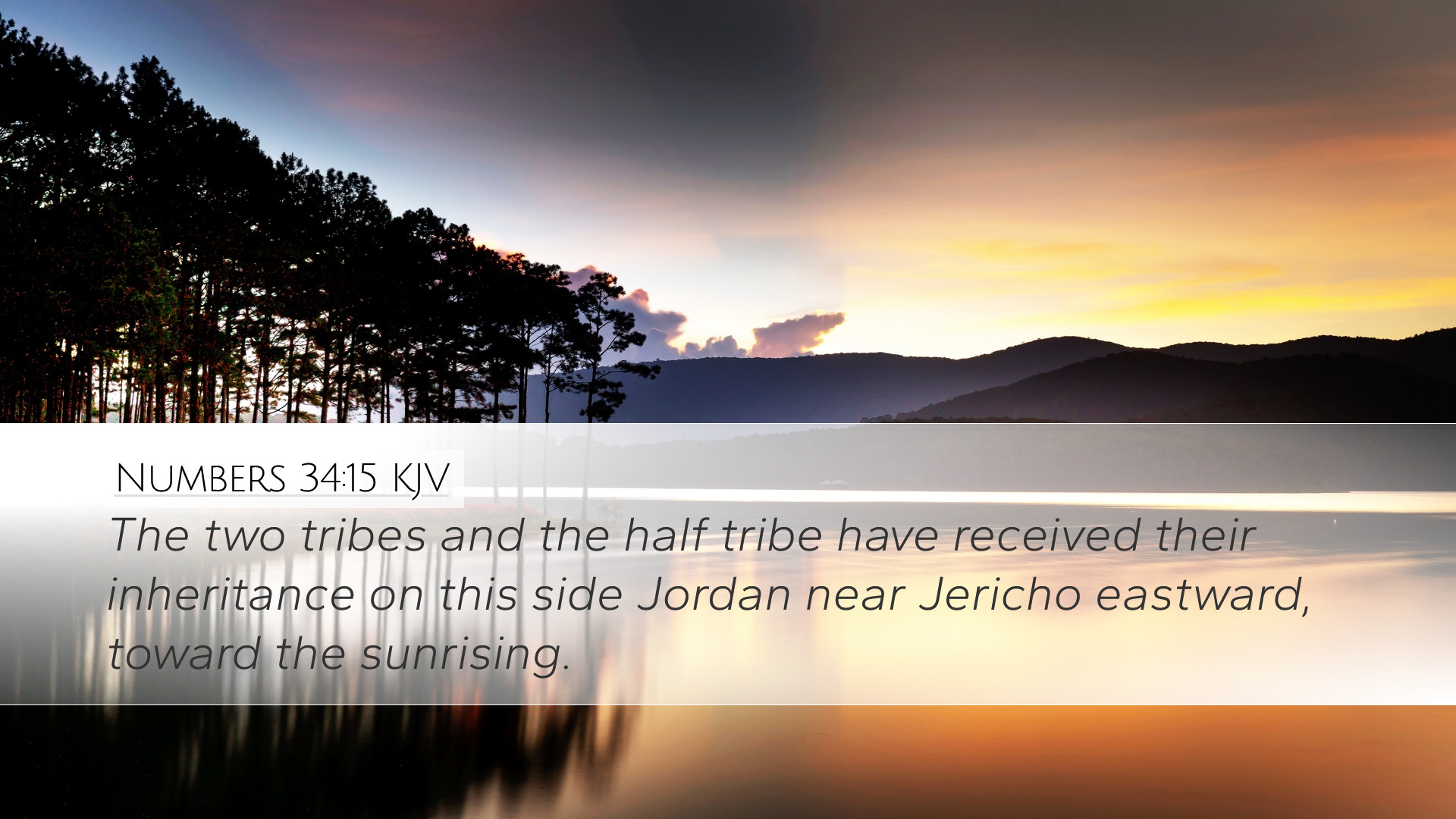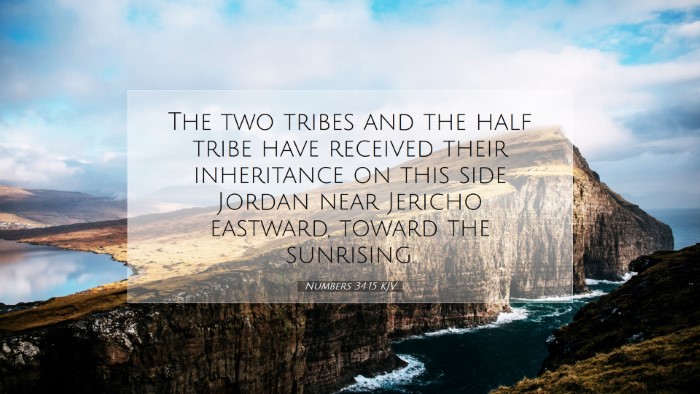Commentary on Numbers 34:15
Verse Text: "The two tribes and the half-tribe have received their inheritance on this side of Jordan near Jericho, eastward, toward the sunrise."
Introduction
Numbers 34:15 provides a pivotal moment in the narrative of Israel's journey as they approach the Promised Land. This verse encapsulates the division of the land and highlights the tribes of Reuben, Gad, and the half-tribe of Manasseh, who settled east of the Jordan River. The significance of this verse extends beyond a geographical assignment; it reflects God's faithfulness and the importance of tribal identity within the broader context of His covenant promises.
Contextual Background
The Book of Numbers documents the Israelites' journey through the wilderness, detailing their organization, struggles, and preparations for entering the Promised Land. Chapter 34 focuses on the boundaries of the land that the Israelites would inherit, and verse 15 specifically refers to those tribes that chose not to cross the Jordan.
Understanding the historical and geographical context is essential for a richer interpretation of this verse. The land east of the Jordan, known for its pastures and resources, was appealing to these tribes. However, their choice also raises questions about commitment and loyalty to their brethren as they would be physically separated from the rest during the conquest.
Insights from Public Domain Commentaries
Matthew Henry's Commentary
Matthew Henry notes that this verse illustrates the divine order in the distribution of the land. He emphasizes that God is the ultimate landlord, determining the inheritance of each tribe. Henry reflects on the lessons of stewardship and responsibility that come with this inheritance, suggesting that the tribes, by settling outside the land of promise, held a dual responsibility: for their own welfare and for that of their fellow Israelites who would be entering the Promised Land.
Albert Barnes' Notes on the Bible
Albert Barnes highlights the significance of the location of the tribes. He points out that although the tribes of Reuben, Gad, and the half-tribe of Manasseh were geographically separated from the other tribes, God's plan for their inheritance was sovereign and purposeful. This separation serves as a metaphor for the concept of holiness, where God's people must remain distinct yet interconnected. Barnes also warns against the dangers of complacency that can arise from settling for less than what God intends, advocating for a faithful pursuit of God's best.
Adam Clarke's Commentary
Adam Clarke provides a detailed analysis of the implications of this verse regarding tribal inheritance. He means that this decision impacts the dynamics within the community of Israel. Clarke notes the necessity of balance between individual desires for land and collective responsibility to the community, reflecting on the spiritual applications this has for believers today. He encourages a deeper understanding of how choices affect community unity and spiritual commitment to God’s covenant.
Theological Implications
Numbers 34:15 invites deeper theological reflection on the nature of inheritance within God's kingdom. The distribution of the land signifies not only physical possession but also spiritual legacy. Each tribe's inheritance can be seen as a microcosm of God's overarching plan for redemption and kingdom life.
- Divine Sovereignty: The assignment of land signifies God's active role in guiding His people and fulfilling His promises.
- Community Responsibility: The collective identity of Israel is vital, with each tribe's well-being impacting the others.
- Spiritual Inheritance: As believers today, we are reminded of our inheritance through Christ and the call to pursue holiness.
Practical Applications
The account in Numbers 34:15 serves as a reminder to pastoral leaders, theologians, and believers about the importance of community integrity and commitment to God’s purposes.
- Promote Unity: Encourage congregations to pursue a sense of unity, recognizing each member’s role in the body of Christ.
- Faithful Stewardship: Inspire individuals to take seriously their call to stewardship of both spiritual and material blessings.
- Encourage Collective Vision: Foster discussions that highlight the importance of pursuing God’s best for the entire community rather than individual desires alone.
Conclusion
Numbers 34:15 is more than a geographical reference; it is a profound statement on inheritance, community, and divine purpose. The insights from key commentators illuminate our understanding of the text and provide rich theological and practical foundations for believers today. As we reflect on this verse, let us commit to pursuing holiness, stewardship, and unity in our communities as we await the fullness of God’s promises in our lives.


